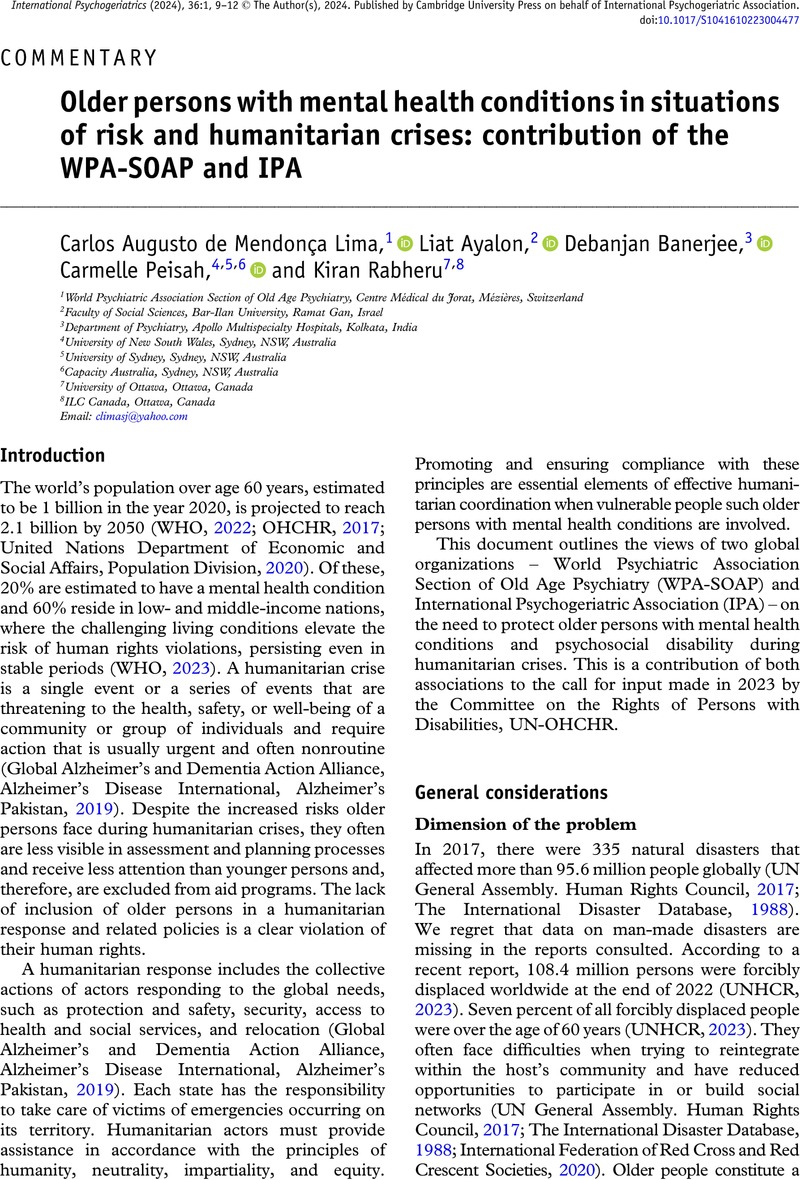No CrossRef data available.
Article contents
Older persons with mental health conditions in situations of risk and humanitarian crises: contribution of the WPA-SOAP and IPA
Published online by Cambridge University Press: 23 January 2024
Abstract
An abstract is not available for this content so a preview has been provided. Please use the Get access link above for information on how to access this content.

- Type
- Commentary
- Information
- International Psychogeriatrics , Volume 36 , Special Issue 1: Issue Theme: Schizophrenia and Other Psychotic Disorders in Later Life , January 2024 , pp. 9 - 12
- Copyright
- © The Author(s), 2024. Published by Cambridge University Press on behalf of International Psychogeriatric Association
References
Charlson, F., van Ommeren, M., Flaxman, A., Cornett, J., Whiteford, H., & Saxena, S. (2019). New WHO prevalence estimates of mental disorders in conflict settings: A systematic review and meta-analysis. Lancet, 394, 240–248.Google Scholar
Cutter, S. L., Boruff, B. J., Shirley, & W. L. (2003). Social vulnerability to environmental hazards. Social Science Quarterly, 84(2), 242–261. https://doi.org/10.1111/1540-6237.8402002
Google Scholar
Global Alzheimer’s and Dementia Action Alliance, Alzheimer’s Disease International, Alzheimer’s Pakistan (2019). Forgotten in a crisis: Addressing dementia in humanitarian response. ADI. https://www.alzint.org/u/2020/08/Forgotten-in-a-Crisis_Report_2019.pdf
Google Scholar
International Federation of Red Cross and Red Crescent Societies (2020). World disasters report 2020. IFRC. https://www.ifrc.org/document/world-disasters-report-2020
Google Scholar
Murthy, R. S., & Lakshminarayana, R. (2006). Mental health consequences of war: A brief review of research findings. World Psychiatry, 5(1), 25–30.Google Scholar
OHCHR (2017, June 6). World needs “revolution” in mental health care − UN rights expert. https://www.ohchr.org/en/press-releases/2017/06/world-needs-revolution-mental-health-care-un-rights-expert
Google Scholar
Peisah, C., de Mendonca Lima, C. A., Ayalon, L., Banerjee, D., de Leo, D., Hwang, T.-J., Ikeda, M., Jeste, D., Leon, T., Wang, H., Warner, J., & Rabheru, K. (2021). An international consensus statement on the benefits of reframing aging and mental health conditions in a culturally inclusive and respectful manner. International Psychogeriatrics, 35(1), 13–16. https://doi.org/10.1017/S1041610222000473
Google Scholar
Schwartz, E., & Litwin, H. (2019, August). Warfare exposure in later life and cognitive function: The moderating role of social connectedness. Psychiatry Research, 278, 258–262.Google Scholar
Schwartz, E., & Shira, A. (2019). Social connectedness moderates the relationship between warfare exposure, PTSD symptoms and heaqlth among older adults. Psychiatry Research, 82(2), 158–172.Google ScholarPubMed
The International Disaster Database (1988). Inventorying hazards and disasters worldwide since 1988. https://www.emdat.be/
Google Scholar
UN General Assembly. Human Rights Council (2017, July 21). Enjoyment of all human rights by older persons. Report of the Independent Expert on the enjoyment of all human rights by older persons. https://documents-dds-ny.un.org/doc/UNDOC/GEN/G17/219/52/PDF/G1721952.pdf?OpenElement
Google Scholar
UNHCR (2023). Global trends: Forced displacement in 2022. UNHCR. https://www.unhcr.org/refugee-statistics
Google Scholar
UNHCR, HelpAge International (2010). Older people in disasters and humanitarian crises: Guidelines for best practice. https://www.helpage.org/silo/files/older-people-in-disasters-and-humanitairan-crises-guidelines-for-best-practice.pdf
Google Scholar
United Nations Department of Economic and Social Affairs, Population Division (2020). World population. https://www.un.org/development/desa/pd/news/world-population-ageing-2020-highlights
Google Scholar
WHO (2013). Building back better: Sustainable mental health care after emergencies. https://apps.who.int/iris/bitstream/handle/10665/96378/WHO_MSD_MER_13.1_eng.pdf?sequence=8
Google Scholar
WHO (2015). MhGAP Humanitarian Intervention Guide (mhGAP-HIG): Clinical management of mental, neurological and substance use conditions in humanitarian emergencies. WHO.Google Scholar
WHO (2017). Scalable psychological interventions for people in communities affected by adversity: A new area of mental health and psychosocial work at WHO. WHO.Google Scholar
WHO (2022, October). World report on aging & health. WHO. https://www.who.int/publications/i/item/9789241565042
Google Scholar
WHO (2023). Mental health of older adults. https://www.who.int/news-room/fact-sheets/detail/mental-health-of-older-adults
Google Scholar
Young, B. H., Ford, J. D., & Ruzek, J. I. (1998). Disaster Mental Health Services: A guidebook for clinicians and administrators. Department of Veterans Affairs.Google Scholar




